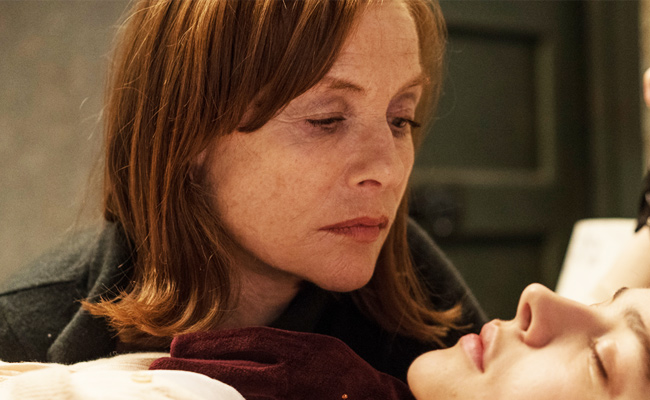
There’s something to Greta, though it’s an open question whether the filmmakers know it.
I used to have an old man at my local coffee shop who would blather on and on, trying to trap every customer in conversation. It was clear that he was just desperately lonely, and if this had been a movie, “sweet old man could use a friend” would’ve been the beginning of a beautiful relationship, where I’d push him down the street in his wheelchair on a fabulously sunny day, we’d both learn valuable lessons and blah blah blah. I would tell myself that I should just talk to him for a bit and relieve his loneliness, but I was afraid of getting trapped. So instead I avoided him like he had the plague.
It’s a curious facet of human nature that our inner altruism can so quickly turn to self-preservation when the task seems too large, or when the person in need reminds us too much of our own failings. This seems to have been the jumping off point for Greta, co-written and directed by Neil Jordan (The Crying Game, Interview With The Vampire) with Ray Wright, a sort of Fatal Attraction for an adult friend.
Chloe Grace Moretz stars as Frances, a Smith College grad living in New York who must’ve majored in tasteful outfits. Frances is still dealing with the death of her mother the previous year — staring morosely out the subway window with her pronounced Cupid’s bow — when she sees that someone has left a purse on a subway seat. Frances’s roommate, Erica (Maika Monroe) a bratty rich girl who lives rent-free in her parents’ Tribeca loft, thinks Frances should just take the cash and chuck the purse. But Frances says “that’s just not the way we do things where I’m from.”
Later we learn that Frances is from Boston, which is apparently a small village of guileless altruists. Instead, Frances tracks down the purse owner, Greta Helbig, who turns out to be an exquisite French woman played by Isabelle Huppert, who lives in a brownstone decorated like a manor. Greta is a widow, grateful for the company, and she tells Frances of her departed husband and her adult daughter who doesn’t call. Greta plays Lizst on the piano, and says things like “relationships are a dream of love” with her eyes half closed. Could this be the beginning of a beautiful friendship? Lonely ol’ Greta could use a friend, and the recently-lost-her-mom Frances (offscreen dead moms continue to do the narrative heavy lifting) seems like the perfect candidate. But what happens when Greta crosses the line between need and desperation?
This is an interesting premise, and Isabelle Huppert is a bold choice as a fatal attraction May-December friendship stalker. Standing across the street from the restaurant where Frances works, staring mutely into the window while dressed elegantly in her felt overcoat and silk scarf, she looks like a cross between Lloyd Dobler from Say Anything and Paddington Bear. It’s a fun concept and a choice sight gag, but the overwhelming impression of Greta is of missed opportunity.
Early in their relationship, Frances accompanies Greta to adopt a dog. They go to a kill shelter and choose the dog who is next scheduled for the gas chamber, an adorable sad old sheep dog named Morton. This could’ve been such a great subplot. An old dog who, instead of making you feel like a good person for saving his life, ended up being more trouble than he’s worth and showed you why no one else had wanted to adopt him, could’ve been the perfect analog for the Frances-Greta relationship. Instead, the same thing that happens to dogs in every horror movie happens to Morton. And that’s Greta in a nutshell: an intriguing idea that’s dead set on being boringly conventional.
In addition, or perhaps related to, its inability to build on ideas, Greta is beset throughout with a bad case of “that’s not how things work.” I don’t want to say “believable” here, because not everything has to be strictly realistic in the most literal sense, it’s just that suspending disbelief should come with some kind of benefit. We shouldn’t have to lean on it for little things, like Greta using a giant Nokia brick as a cell phone in 2019, or young women having a landline in their apartment, or Frances just leaving her unlocked, unattended bike leaning next to a building in New York City. Those little things have a way of adding up, and they take you out of a narrative.
When Erica hears Frances will be skipping her party to have dinner with Greta, Erica yells “Did I just snort crystal meth or did you just ditch me to hang out with an old lady?!” Erica is an over-the-top caricature, but the movie seems to think she’s just the normal kind of friend people in New York have. When Frances calls her father, we see him wearing a tie, standing in front of a giant blueprint of a boat. We don’t know what he does for a living, but it sure seems important!
Every character in the movie feels like this, like an idealized, overly chaste, old-timey version of whatever they’re supposed to be. And in the absence of Greta building on any of its ideas, that becomes the story, of a movie mimicking other movies, and doing so unconvincingly. It’s the kind of movie that feels like it’s set New York not because the writer has anything to say about New York, but because “movie set in New York” sounds important.
Greta is about two-thirds of an interesting movie. It feels like what happens when a storyteller hits on an interesting idea but doesn’t realize it.
Vince Mancini is on Twitter. You can find more of his reviews here.






